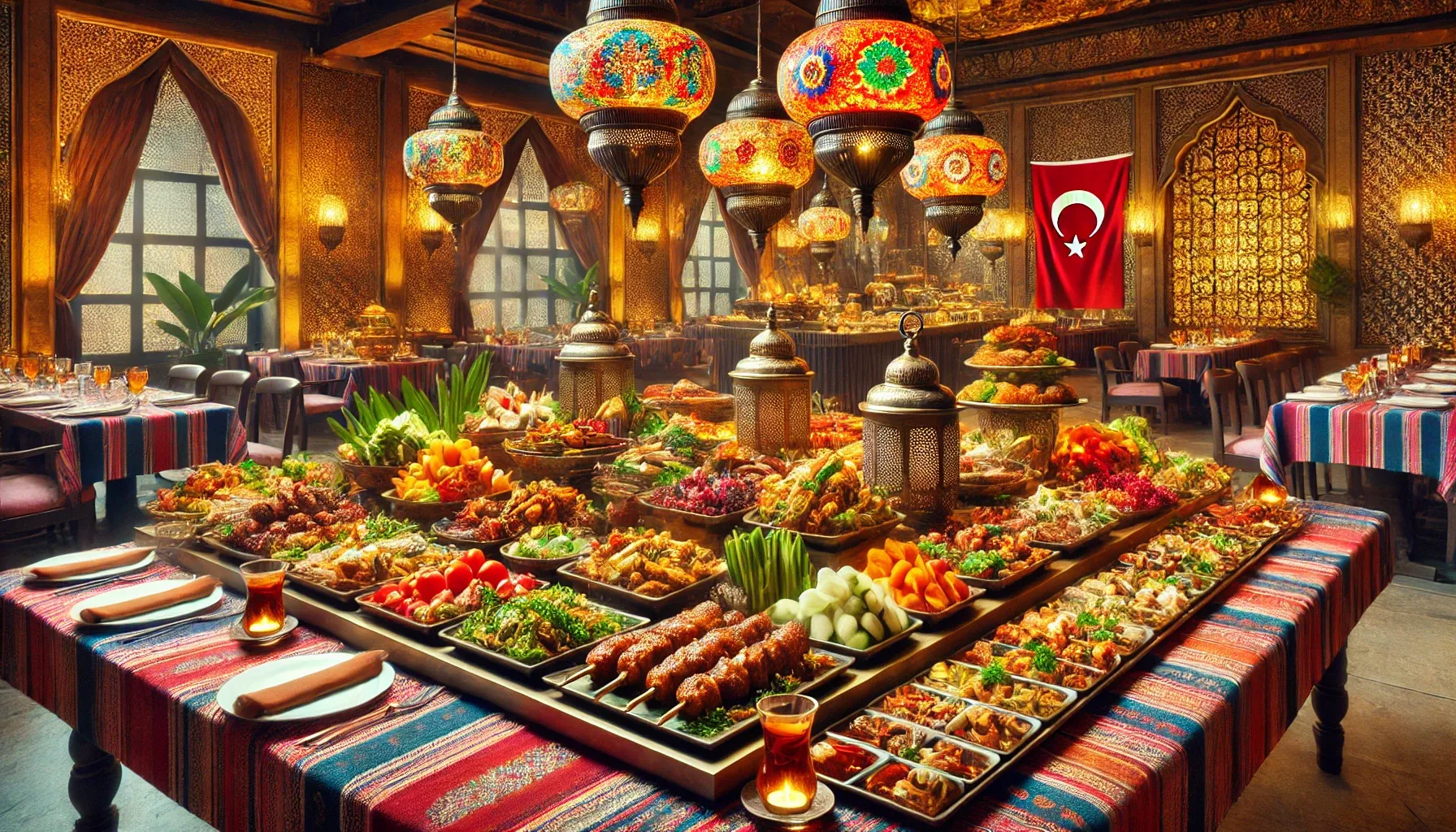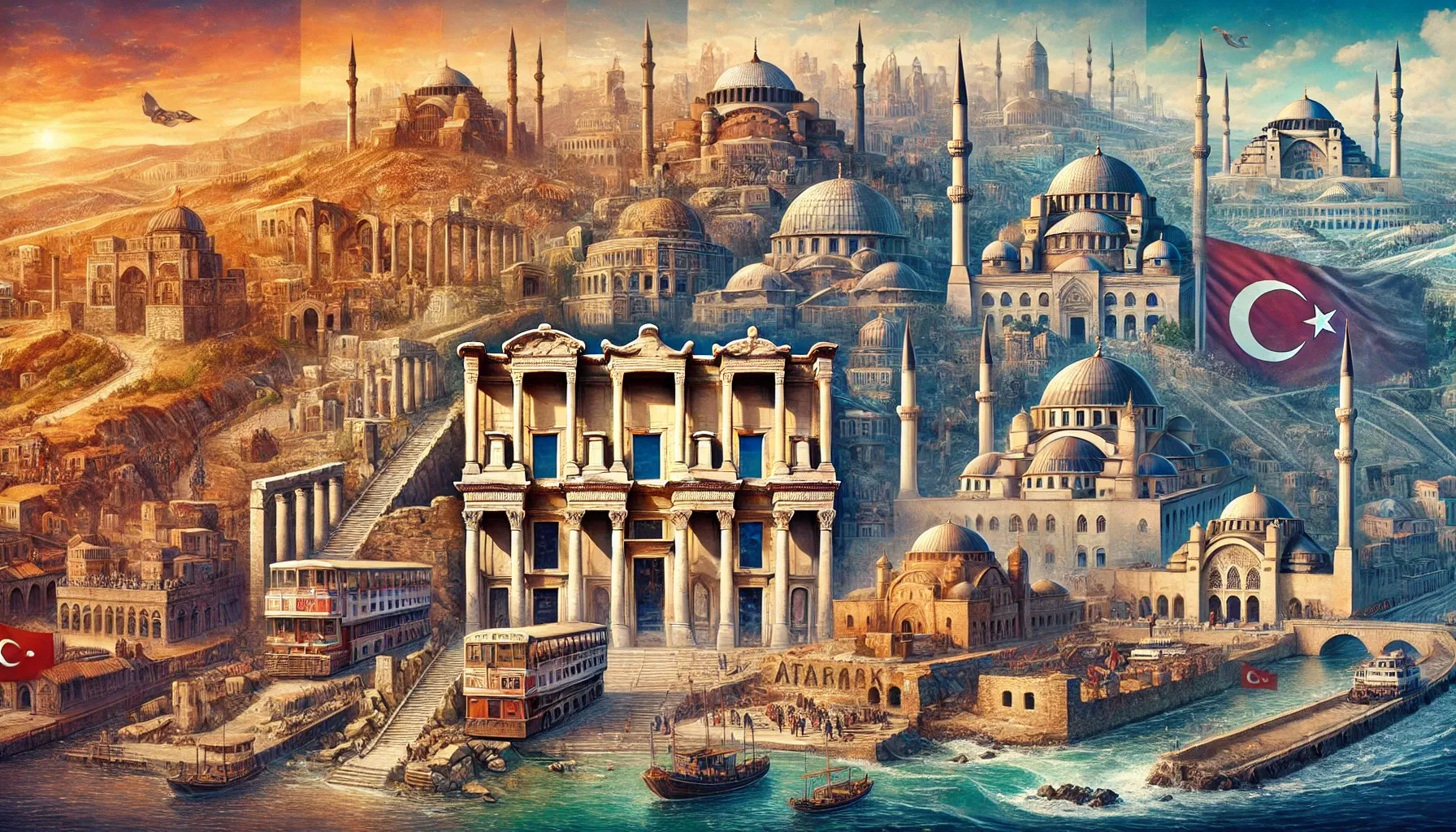Buffet in Turkey: hustle and happiness

- The history of Turkey: from ancient times to the present
- Turkey: economy and politics
- Secrets of Turkey
The history of Turkey
Before the arrival of Greek colonists, small state formations developed on the peninsula of Asia Minor, which managed to exist until around 700 BC. Troy, located on the shores of the Aegean Sea, was destroyed many centuries ago, at the same time as the city of Troy. From the 6th century BC to 333 BC, the region was under Persian rule, followed by the empire of Alexander the Great, and then the Pontic Kingdom, which encompassed the entire southern coast of the Black Sea.
In the northwest part of Asia Minor was the Kingdom of Pergamon, which later came under Roman control. The entire peninsula became part of the Roman Empire, and then the Eastern Empire, during the time of its rule, until the territories fell under the control of the Roman Empire, which later became part of the Eastern Roman Empire.
Turks in Asia Minor
The Turkic tribes, the ancestors of modern Turks, came to Asia Minor from Central Asia and became known to Europeans by the 6th century. In the 9th century, the Turks converted to Islam, and by the 11th century, they began to conquer Asia Minor. This continued even after the establishment of the Ottoman Empire in 1299. In 1453, the Turks captured Constantinople, the capital of Byzantium.
Ottoman Empire
The Ottoman Empire reached its peak in the 17th century, encompassing territories in the Middle East, North Africa, and the Balkan Peninsula. In the 19th century, its power weakened, and separatist sentiments grew stronger.
Modern Turkey
At the end of World War I, Turkey found itself under the control of multiple countries. The occupation led to the War of Independence. Turkish nationalists, led by Mustafa Kemal, proclaimed the Republic in 1923, and Kemal became the first president, adopting the name "Atatürk" ("father of the Turks"). Turkey became the only secular Islamic state where religion was separated from the government.
Multi-party system was established in Turkey after World War II, but the ruling coalitions were unstable. Military coups occurred in 1960, 1971, and 1980, slowing down political reforms in the country.

Turkey: economy and politics
In the past, military leaders in Turkey achieved significant successes in the economy; however, domestic politics were marked by the persecution of the opposition, including Islamists and communists. The parliamentary system was restored only in 1983. Modern Turkey is a parliamentary republic, where the head of state is the president, elected by popular vote every five years.
Legislative power and the economy
The legislative power belongs to a unicameral parliament, and the unemployment rate is 9.7%. Turkey is home to branches of major international companies such as Siemens, Hewlett-Packard, Ford, Bosch, Motorola, Microsoft, Coca-Cola, and others.
Tourism and resorts
Tourism plays a significant role in the country's economy, especially on the coasts of the Black and Mediterranean Seas. The main resorts are Antalya, Alanya, Izmir, Marmaris, Belek, Bodrum, Didim (coastal), and Sarıkamış, Erzurum, and Palandöken (ski resorts).
Industry and agriculture
The industry includes textile, leather, food, chemical, pharmaceutical production, energy, metallurgy, shipbuilding, automotive manufacturing, and the production of electrical appliances. The main agricultural crops are cotton, tobacco, olives, grains, and sugar beets.
Currency and public holidays
The national currency of Turkey is the Turkish lira. Public holidays include New Year's Day (January 1), Children's Day (April 23), Youth and Sports Day (May 19), Victory Day (August 30), and Republic Day (October 29).
29 September
9 October 2024
29 January
9 October 2024
Attractions
Turkey is famous for its numerous attractions, including the only city where baths are used to heat temples, and a church made entirely of iron for safety reasons. The former capital of the Ottoman Empire, Istanbul, is a city of contrasts where East meets West, Asia meets Europe, and Islam meets Christianity. It is also home to thermal springs that are popular in the southwest of the country.
The emergence of the white terraces in Pamukkale occurred due to the deposition of salts from calcium springs on the mountainside. This place, which began with an unremarkable origin, captivates the imagination with its stunning beauty and is listed as a UNESCO World Heritage site. Additionally, a famous scene from the film "Odyssey" was filmed here.
Historical delicacy
The recipe for the treat "rahat-lokum" is quite simple: sugar (or flour), starch, and nuts. This dessert has its origins over 500 years ago.
The football glory of Turkey
The football club "Fenerbahçe" is the most decorated club in Turkey. Its official colors are blue and yellow, which served as the basis for the nickname "yellow canaries" adopted for the players.
Everything is included in Turkish hotels.
In Turkish hotels and accommodations, the "all-inclusive" system is popular, offering free breakfasts, lunches, dinners, and drinks. However, it's important to remember that this can lead to weight gain or digestive issues.
Tarkan - the Turkish prince of pop music
Tarkan, the Turkish prince of pop music, has won the hearts of women with his songs "Dudu" and "Şıkaşam." His unique talent and the lack of necessity to sing in English have made him a key artist in the history of European pop music, according to the music portal "Rhapsody."
Traditions of Turkish coffee
Coffee in Turkey has its own unique history, rituals, and specific rules of consumption. In ancient times, the wealthiest residents of the country were appointed to positions where their duty was to prepare coffee and conduct the coffee ceremony. The first specialized coffee shop was opened in Constantinople in 1475.
Feel the spirit of Turkey
To truly experience the atmosphere of Turkey, it's worth visiting a local bazaar, where an Eastern vibe prevails and the trading process can be just as captivating as any gambling game.
```Conclusion:
I was at a buffet in Turkey and experienced all its delights. The noise, the numerous tourists, the variety of culinary treats - all of this makes Turkey a unique and attractive vacation spot. Here, you can enjoy the picturesque landscapes, the scents, and the colors of the country. The feeling of a continuous line of lights along the coast, the sound of the sea drowning out the distant disco, makes me feel like a winner of time.
The history of this country is rich with events and achievements: from settlements 10,500 years ago to the formation of the republic in 1923. Islam is the main religion in Turkey, but the country is a secular state with a separation of religion and politics.
Thus, if you love noise and hustle or want to escape from the Russian language in this colorful country, Turkey is waiting for you! And if these aspects don't attract you, then come back again after an active day at the beach or spending the day outside the hotel, enjoying the view from your balcony with a glass of something completely non-Turkish... Many cities are waiting for your visit: Istanbul, Izmir, Bursa, Adana, and others. Various climates...
Tags
Comment
Popular Posts
29 September
377
9 October 2024
1485
9 October 2024
9940
Popular Offers

Subscribe to the newsletter from Hatamatata.com!
Subscribe to the newsletter from Hatamatata.com!
I agree to the processing of personal data and confidentiality rules of Hatamatata














